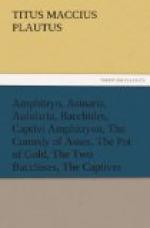PERSONAE.
DRAMATIS PERSONAE
LAR FAMILIARIS PROLOGVS
EVCLIO SENEX
STAPHYLA ANVS
EVNOMIA MATRONA
MEGADORVS SENEX
PYTHODICVS SERVVS
CONGRIO COCVS
ANTHRAX COCVS
STROBILVS SERVVS
LYCONIDES ADVLESCENS
PHAEDRIA PVELLA
TIBICINAE
THE HOUSEHOLD
GOD OF EUCLIO, the Prologue.
EUCLIO, an
old gentleman of Athens.
STAPHYLA, his
old slave.
EUNOMIA, a
lady of Athens
MEGADORUS, an
old gentleman of Athens, Eunomia’s brother.
PYTHODICUS, his
slave
CONGRIO, cook.
ANTHRAX, cook.
STROBILUS, slave
of Lyconides.
LYCONIDES, a
young gentleman of Athens, Eunomia’s son.
PHAEDRIA, Euclio’s
daughter.
MUSIC GIRLS.
Scene:—Athens.
A street on which are the houses of
Euclio and Megadorus, a narrow
lane between them, in
front an altar.
PROLOGVS
PROLOGUE
LAR FAMILIARIS
SPOKEN BY EUCLIO’S HOUSEHOLD GOD
Ne quis miretur qui sim, paucis eloquar ego Lar sum familiaris ex hac familia unde exeuntem me aspexistis. hanc domum iam multos annos est cum possideo et colo patri avoque iam huius qui nunc hic habet sed mi avos huius obsecrans concredidit thensaurum auri clam omnis. in medio foco defodit, venerans me ut id servarem sibi.
That no one may wonder who I am, I shall inform you briefly. I am the Household God of that family from whose house you saw me come. For many years now I have possessed this dwelling, and preserved it for the sire and grandsire of its present occupant. Now this man’s grandsire as a suppliant entrusted to me, in utter secrecy, a hoard of gold: he buried it in the centre of the hearth, entreating me to guard it for him.
is quoniam moritur—ita avido ingenio fuit— numquam indicare id filio voluit suo, 10 inopemque optavit potius eum relinquere, quam eum thensaurum commonstraret filio; agri reliquit ei non magnum modum, quo cum labore magno et misere viveret.
When he died he could not bear—so covetous was he—to reveal its existence to his own son, and he chose to leave him penniless rather than apprise him of this treasure. Some land, a little only, he did leave him, whereon




